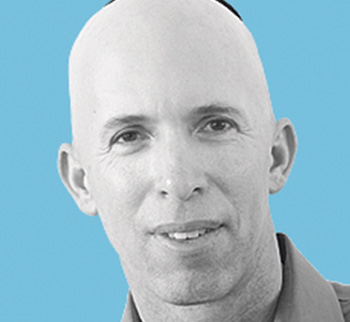Dedicated to my son Guy and his fellow graduates of the Israel Defence Forces' Special Forces Airborne Rescue and Evacuation Unit 669 training course, May 2015
Thousands aspired. Hundreds qualified. Scores started. And you few, completed the rigorous training and received your “cat” wings.
Some 18 months ago, during the first week of your basic training, Team Commander L came into your room late at night, turned on a stick-light, announced, “To be a warrior in this unit you have to work very hard,” and then left. And hard you worked indeed.
After several months in the army, Guy shared his first insights into military service. “Abba, now I know you leave the army with three things: experiences, injuries and friends.” Experiences you had and will have galore. Your list of injuries is too long and painful to detail. As for friends, how much closer can you be than to a teammate you have spooned with so as not to freeze on a cold winter’s night, stinking from a week without showering, crammed into a goat cave during a week of survival training in the wilderness?
Gradually you were exposed to the abilities and the missions of the unit. Well into the course, Guy said: “I suddenly realized that if, God forbid, a pilot had to abandon his fighter jet somewhere in enemy territory, the whole country would rally to save him. Generals would issue orders, squadrons would be scrambled, units sent in, forces moved. But ultimately it would be down to us, the ones they call ‘cats,’ hanging from helicopter cables. We would be the ones responsible for rescuing him and bringing him home safely. This realization made me understand our responsibility and why and for what we are being trained.”
At the graduation ceremony, I looked at the emotion-filled faces of the families. I tried to understand the source and significance of the tears that sparkled in the eyes of so many of us, fathers and mothers, grandfathers and grandmothers, siblings and girlfriends. Tears of pride – naturally. Concern for the safety of our sons – of course. But there was something more: amazement, and the realization that this was it. Understanding that the boy we had walked to Grade 1 not so long ago, to whom we had read bedtime stories, whose bar mitzvah we had celebrated – from today, that boy will be hanging from the end of the country’s helicopter cable. The shoulders that so recently bore a schoolbag will now bear the responsibility to rescue any comrade – brother, sister, father – at any time, at any place, in any way.
Tears of pride mingled with sadness mixed with amazement. In my own eyes welled other tears, also from that typically Jewish blend of joy and sadness: the ceremony took place on the 20th anniversary of the passing of my mother Zahava, of blessed memory. You, Guy, were her first grandchild, and on her 20th yahrzeit, your grandmother also gives you a great big, proud hug.
During your comprehensive training, you learned to shoot, parachute, glide, dive and climb. You practised guerrilla warfare, survival, emergency medicine and much more. I don’t know any other army in the world that invests so much in training and operating a rescue force like yours. It’s one of the secrets of the IDF’s strength. Without this commitment and ability, our army would be less strong and less determined.
The motto of the unit in which you serve as fighter-rescuers reflects its mission: “In distress you called, and I rescued you” (Psalms 81:9). Every IDF soldier, male and female, knows that if they get into dire straits while fulfilling their duty – in the air, at sea, on land or underground, within the country’s borders or outside them – you will come, like cat angels, to bring them home.
Finally, I have a personal request: while you’re rescuing others, please remember to also take care of yourselves.
